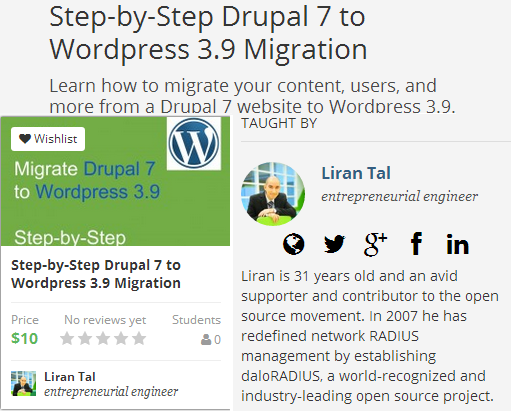~ 4 min read
Migrate Drupal 7 to WordPress 3.9 – The Conclusion

Migrate Drupal 7 to WordPress 3.9 - To recap, in a previous post on this series, I’ve set the background for my action to migrate from Drupal 7 to WordPress 3.9. In this post, we will explore the process of making this migration happen.
If you’ve been on this search before to migrate from Drupal to WordPress, then you’ve realized that there aren’t a lot of resources, and that you may have some preferences in regards to the migration process. Some solutions that popped required to have both instances of Drupal and WordPress up and running for some reason, but that didn’t fit my requirements as I wanted to use the same domain and not needing to setup another one just for the migration process. Other solutions are of course professional support services which will perform the migration for you, but you’d have to say goodbye to a few hundred dollars to begin with (prices range from $750 to $3500 for a website migration)
Finding Drupal2Worpdress provided me a good start to get things rolling. As with most things on Github for me, I usually begin by forking a repository and Drupal2Wordpress was no exception. Quickly after I reviewed the code in the original repository I found out that the script is very small and focused, without requiring any special dependencies or extra configuration which was my primary goal – finding the most simple solution as possible. Now I’m ready to take a stub at it.
My Video Course - Step by Step Drupal 7 to WordPress 3.9 Migration
I created a Video course on Udemy.com to teach you the skills of migrating Drupal 7 to WordPress 3.9.
I’d appreciate if you leave a review after taking the quick course
Step-by-Step Drupal 7 to WordPress 3.9 Migration Learn how to migrate your content, users, and more from a Drupal 7 website to WordPress 3.9.
Getting to Business with Drupal2Wordpress
Drupal2Wordpress is essentially very simple. It only requires to edit the PHP code at the beginning, and set the connection information correctly for both WordPress and Drupal database. That already implies on the characteristics of this migration tool – it expects that both instances of Drupal and WordPress are available through a database connection and since this tool has to be accessible and run on the hosting account service and be triggered from the web or from a cron job (because hosting accounts do not open their database servers to the public).
Some of my fixes to this tool began with importing any content type from Drupal, yet making sure they are imported into WordPress as eligble posts content type (as opposed to pages for example, which aren’t blog related). URL aliasing has also been fixed so that imported posts in the new WordPress install are just working good, as well as another fix to migrate only approved comments. New additions to the tool included the support for migrating users, and adding a default ‘Blog’ category on WordPress and relating all posts to it (as otherwise they are not displayed).
The tool has been tested and it only requires to get a fresh installation of WordPress 3.9 to migrate any Drupal 7 site to it. You’re welcome to fork out the repository or test it and comment so we can further improve upon it.
Drupal2Wordpress – the Github repository.


